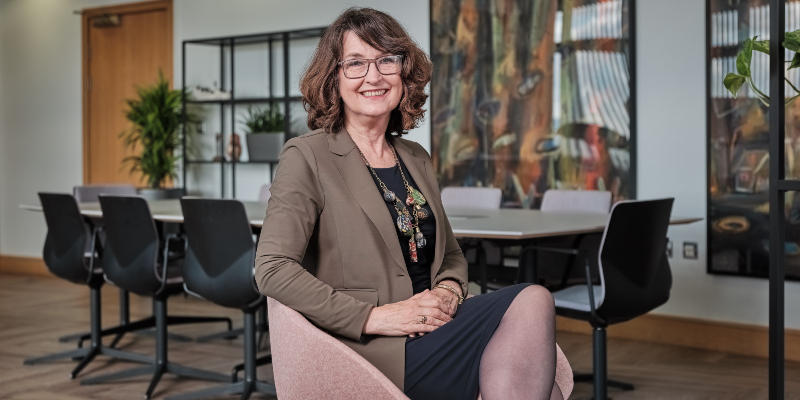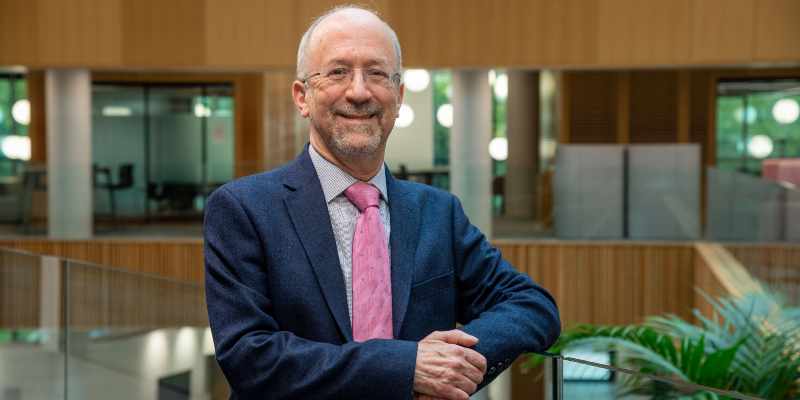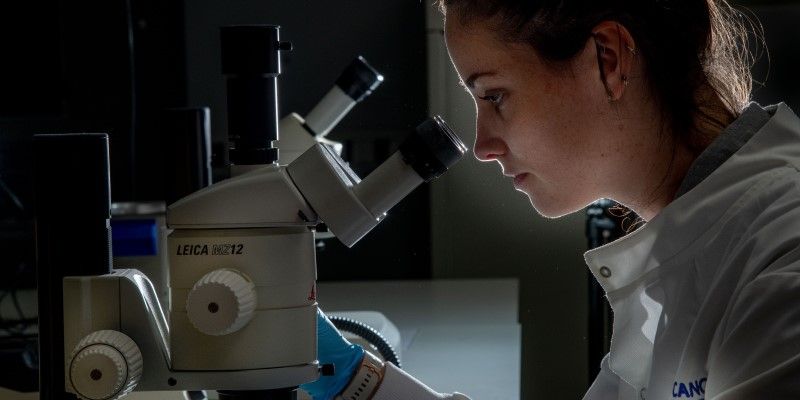An ambitious vision placing Leeds at the global forefront of cancer research is officially set out today.
The University is partnering with Leeds Teaching Hospitals NHS Trust to create the Leeds Cancer Research Centre, a new venture bringing together experts from across a range of disciplines including biological, physical, engineering and clinical sciences; clinical practice and innovative health interventions, to tackle some of the greatest challenges facing cancer research today.
The Centre’s goal is to transform the prevention, diagnosis, and treatment of cancer; tackle cancer-related health inequalities, and improve patient outcomes in Leeds, Yorkshire and across the globe.
The Leeds Cancer Research Centre will enable us to accelerate cancer detection, diagnosis and treatment by harnessing our considerable strengths and by fostering greater connections.Professor Simone Buitendijk, Vice-Chancellor
Although UK cancer survival has doubled in the last four decades, only 50% of patients survive 10 years or more. Over a third of cancers are preventable and another third can be cured if detected early and treated properly.
In Yorkshire, more than 31,000 new cases are diagnosed every year, with the third-worst outcomes in England. Nearly a fifth of the Leeds City Region’s population lives in areas of severe social deprivation where cancer is the leading cause of death, with lung cancer accounting for over half of the cases.
Some 40% of people from these communities who develop cancer are diagnosed at a late stage – and have a 50% greater chance of dying from the disease than those who live in Leeds’s least deprived areas.
The problems are predicted to worsen due to the impact of the COVID-19 pandemic, with more cases diagnosed at a late stage due to limitations on cancer screening and fewer patients visiting their GP during lockdown.
Accelerating cancer care
Professor Simone Buitendijk, University Vice-Chancellor, said: “Our vision of helping to shape a better future for all relies on collaboration, using challenge-led research to tackle the inequalities experienced by people both locally and around the world.
“The Leeds Cancer Research Centre will enable us to accelerate cancer detection, diagnosis and treatment by harnessing our considerable strengths in structural and chemical biology, clinical research, physical sciences and engineering, and by fostering greater connections across the clinical, research and patient community.”

The University of Leeds is already home to some of the most advanced facilities in the world, including the STORM laboratory where engineers are developing robotics to enable intelligently guided diagnosis and treatment of hard-to-reach cancers. In the Astbury Centre for Structural Molecular Biology scientists are using cutting-edge technology to discover novel, chemical tools that accelerate the development of new and less toxic drug treatments.
The Leeds Lung Health Check study, led by Leeds Teaching Hospitals Respiratory Consultant Dr Mat Callister, has diagnosed more than 200 cancers early, allowing patients to receive curative treatment with surgery or radiotherapy. Funded by Yorkshire Cancer Research, it aims to tackle health inequalities in Leeds, taking mobile units into shopping centres in areas of high deprivation and smoking prevalence, where people at risk of lung cancer can be scanned and the disease, if present, can be diagnosed early.
And an international team of scientists from the UK, Canada, US, Netherlands, and Spain, including Professor Phil Quirke, is working on a £20 million Cancer Research UK Cancer Grand Challenges project which has discovered that gut micro-organisms are not only capable of initiating bowel cancer but could also be used to provide a more effective bowel cancer screening test that would significantly reduce the number of patients who need to have a colonoscopy.
Leeds at the forefront
The new centre is led by Clinical Director David Sebag-Montefiore, Professor of Oncology in the University’s School of Medicine and Consultant Clinical Oncologist at Leeds Teaching Hospitals, alongside Deputy Directors Richard Bayliss, Professor of Molecular Medicine in the School of Molecular and Cellular Biology, and Pietro Valdastri, Professor of Robotics and Autonomous Systems in the School of Electronic and Electrical Engineering.
Professor Sebag-Montefiore said: “Our vision is for Leeds to be at the international forefront of tackling cancer.
“The Centre builds on the city’s rich heritage of a century of cancer research, from the founding of the Radium Centre at Leeds General Infirmary in 1929 and the discovery of Tamoxifen in the 1970s as a highly effective treatment for patients with breast cancer.
“Today Leeds is producing world-leading research in structural and chemical biology, cancer pathology, clinical trials, haematological and bowel cancers, and is home to Centres of Excellence for radiotherapy and brain cancer research.
“The creation of the Leeds Cancer Research Centre comes at a critically important time. The pandemic reinforces the need for cheaper, safer, and more effective treatments for patients, and the need to reconfigure our health care system to ensure safe effective cancer treatment during future viral outbreaks.”

Dr Phil Wood, Chief Medical Officer and Deputy Chief Executive at Leeds Teaching Hospitals NHS Trust (LTHT), said: “LTHT is very supportive of the ambition and scope of this exciting new venture. Cancer diagnosis and treatments are a crucial part of our clinical services for the people of Leeds, Yorkshire and the Humber and beyond, and our partnership with the university is vital to the research and innovation in our region and nationally.
“We very much welcome the focus on improving patient outcomes in Leeds and tackling cancer-related health inequalities. We would like to thank our partners the University of Leeds and Yorkshire Cancer Research, for helping to give Leeds as a city the opportunity to be at the cutting edge of cancer treatment.”
Adam Nelson, Professor of Chemical Biology at the University of Leeds and the Leeds Cancer Research Centre’s Training Lead for Cancer, said: “The Centre will provide an outstanding interdisciplinary research environment and culture to train the cancer researchers of tomorrow. It will equip a new generation of diverse research leaders by instilling a culture of collaboration, and giving them the essential expertise, tools, technologies, leadership, and ambassadorial skills to become the cancer leaders of the future.”
The Centre will be officially launched at a virtual event on Friday 4 February. World Cancer Day also takes place on this date, and this year’s theme is Close the Care Gap, focusing on creating fairer access to cancer care – a key strategic aim of the Leeds Cancer Research Centre.
Research excellence at Leeds
- The £7 million Oncological Engineering research project led by Professor Richard Hall, an expert in medical engineering from the School of Mechanical Engineering, is developing a new imaging and keyhole surgery approach to the treatment of secondary bone tumours of the spine.
- The UKRI-funded Centre for Doctoral Training in artificial intelligence for medical care and diagnosis is training a new generation of researchers.
- CRUK RadNet Centre of Excellence in Leeds combines artificial intelligence, magnetic resonance imaging and new drugs with radiotherapy to target pelvic, liver and brain cancers. It is part of the national RadNet network.
- The Leeds CRUK Clinical Trial Unit performs groundbreaking work to identify better and less toxic treatments for patients with blood cancers and treatments involving radiotherapy.
- Scientists in the Astbury Centre for Structural Molecular Biology use structural and imaging approaches to understand the molecular and cellular basis of cancer and to discover new routes towards future therapies and diagnostics.
- Researchers in the STORM laboratory are developing a new generation of intelligent robotic endoscopic instruments to enable earlier diagnosis, wider use of screening and more effective treatment for cancer.
- Leeds is a Tessa Jowell Centre of Excellence for brain cancer research and care.
Further information
- For media enquiries, email Lauren Ballinger via l.ballinger@leeds.ac.uk.
- For information about the centre, contact Dr Danielle Battle, LCRC Research & Innovation Development Manager via d.battle@leeds.ac.uk.
Main images shows University of Leeds PhD Researcher Amy Turner.

